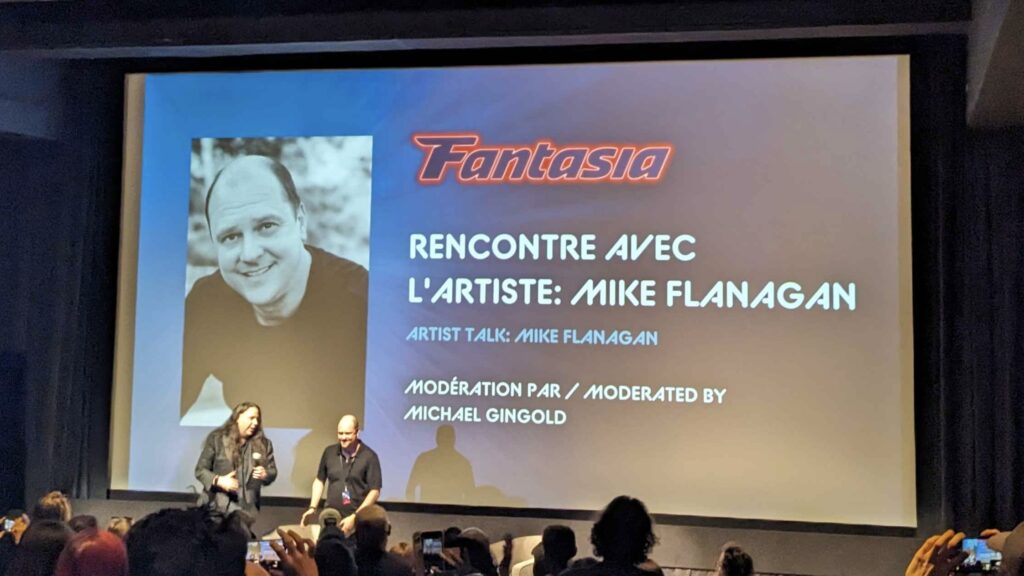Last Sunday, Montreal’s International Fantasia Festival awarded beloved horror filmmaker Mike Flanagan with its Cheval Noir Career Achievement Award. The free event, hosted by former editor-in-chief of Fangoria Michael Gingold, saw fans lined up around the block hoping to hear their favorite director talk about his work.
Most of the discussion focused on Flanagan’s early career, and how the writer-director stretched his creative abilities to fit his means. Fantasia’s artistic director, Mitch Davis, introduced the talk by sharing an anecdote about Flanagan’s first ever feature Absentia, a micro-budget film that Davis had personally promoted back when it debuted at Fantasia. Though Flanagan had been trying to get his first short film made into a feature (which would eventually become Oculus), the industry’s reluctance to take a chance on an unknown filmmaker made him pivot to making a feature film independently. He eventually wrote what would become Absentia based on his available resources: his own apartment, some talented friends, and a very creepy tunnel across the street.
Photo taken by Eli Bad Critic
Flanagan also discussed the highs and lows of his various projects, how the ones he was most excited about during production had a poor commercial reception (Ouija: Origin of Evil or Doctor Sleep), or how industry politics prevented some projects from ever being released, like his feature Before I Wake, which was almost lost when Relativity Media went bankrupt in 2015.
Doctor Sleep, a sequel to The Shining, remains a beloved film among his fans. “I got sober making it,” he told the crowd. “[The Shining is] a film and book about sobriety, and I came through the other side of it”. He explained how his approach to adapting Stephen King’s book was to create a kind of “parent trap” between King’s original story and Kubrick’s visuals. Even though the film wasn’t a commercial success, both King and the Kubricks’ estate approved the project, two entities who’ve been at odds for over 40 years. “The parent trap worked!” Flanagan laughed.
As the conversation wrapped up, Flanagan pressed the importance of horror as both a genre and a vehicle for empathy. “Horror is a mirror for us to examine our anxieties and our shortcomings,” he told the audience. “Basic empathy for each other is essential, and horror breeds empathy.” At the heart of Flanagan’s work, both his films and his wildly successful TV series, like The Haunting of Hill House and The Haunting of Bly Manor, are consistent themes about families struggling to find meaning in the face of trauma. “I had a wonderful childhood” Flanagan insisted, going on to explain that he sees the family unit as a kind of safety fortress, and that the horror in his stories arise when that safety is corrupted. Flanagan is currently working on a script for the next Exorcist film, due out in 2026. “I haven’t felt this nauseous [about a project] since Doctor Sleep,” he laughed. “I hope you’re not mad!”
Mike Flanagan’s presence at the festival coincided with the world premiere of Shelby Oaks, a film he executive produced with first-time filmmaker Chris Stuckman. Known as a prominent film critic on Youtube, Stuckman pivoted to filmmaking in 2021, raising an over $1.3 million budget from a record-breaking crowdfunding campaign. At the sold-out premiere, Stuckman echoed the advice of his mentor about using whatever resources are available to do your project. Shelby Oaks is full of impressive sets, including an abandoned prison and an overgrown amusement park, actual locations in Ohio near where he grew up. “Ohio has no shortage of abandoned shit,” he laughed.
Shelby Oaks is a perfectly respectable debut feature, and just a few days before its premiere, Neon Rated acquired its distribution rights. As the credits rolled, the crowd (which even included a few original crowdfunders) gave both filmmakers a standing ovation. The screening quickly became a celebration of DIY films and an ode to artists who carve their own paths.
